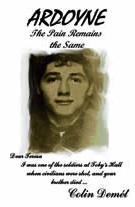
A former British soldier who deserted after his regiment shot up a Belfast dancehall has met with the sister of the man gunned down and killed that night.
Colin Demet, who described his Queen’s Lancashire Regiment (QLR) colleagues as “psychotic killers”, came face to face with Theresa Watts who was dancing with her brother Jo-Jo Parker when soldiers riddled the hall in December 1971, thirty-eight years ago this week.
The Ardoyne father of two died after being shot in a hail of gunfire in Toby’s Hall after soldiers unleashed gunfire both inside and outside the dancehall.
Colin Demet, whose meeting with Theresa was recorded by Irish television and broadcast on Sunday night, said Jo-Jo’s death had been “immoral and inhumane” adding that meeting his sister had been like “crossing the divide”.
Mr Demet, who was captured by the IRA after he fled the regiment’s Flax Street Mill base in the wake of the killing and Bloody Sunday just two months later, said the QLR should never have been out on the streets.
“The soldiers that shot that night, broke every conceivable rule, you don’t shoot unless you identify a target, and it happened again on Bloody Sunday,” Mr Demet said.
“The next night they cheered as if it was a battle against the Germans they had won, that was their mentality. They were psychotic kilers, frustrated they couldn’t let let loose and kill because that’s what they were trained to do. The QLR should not have been in Ardoyne, they weren’t trained to police the streets, they were trained to kill people and it was like putting a pitbull in a playground.”
Mr Demet said the soldiers opened fire on the dancehall because they believed their colleagues inside were being attacked. The shooting broke out after one soldier fired his weapon into the ceiling. Around 28 shots were subsequently fired by the British Army into the walls from the outside while inside further 18 shots were fired. Two of the bullets skimmed the heads of local people while Mr Parker was killed.
Theresa Watts was facing the door and witnessed one soldier, fire from hip height and aim his rifle around the dance hall.
“This blonde haired soldier was at the door. He was at the doorway and I know that because I was facing the door. He got down on one knee and he started gunning from the hip. If he was standing in front of me now I could tell you if it was him.
“This soldier, he was young too, he just riddled the place. I fell one way and Jo-Jo fell the other.
“When the soldiers left, everyone got up and my brother didn’t. He groaned and I knew he had been shot.”
Despite the trauma and tragedy of that night Theresa said she was glad she met Mr Demet face to face, while the former soldier said meeting the Ardoyne woman was a milestone in his life.
“I had a lot of feelings of guilt and although she knew I was coming, I needed her to accept me and I was worried she would push me away but she didn’t.
“It was like crossing the divide. She was great and what happened to her brother was immoral and inhumane.”
Demet eventually deserted from the British Army in February 1972, two weeks after the events of Bloody Sunday. He fled the regiment’s Flax Street Mill base and was taken by the IRA and held in a safe house.
Tensions were running high amongst republicans in the aftermath of Bloody Sunday and a vote was taken whether to shoot him and another deserter dead. The vote to keep the soldiers alive was narrowly secured vote and the pair were taken to Dublin.
Some time later Colin returned to England to be court-marshalled and was handed a seven year prison stretch in Wakefield Maximum security prison.
Jo Jo Parker’s case is currently being investigated by the Historical Enquiries Team.
![[Irish Republican News]](https://republican-news.org/graphics/title_gifs/rn.gif)
![[Irish Republican News]](https://republican-news.org/graphics/title_gifs/harp.gif)

